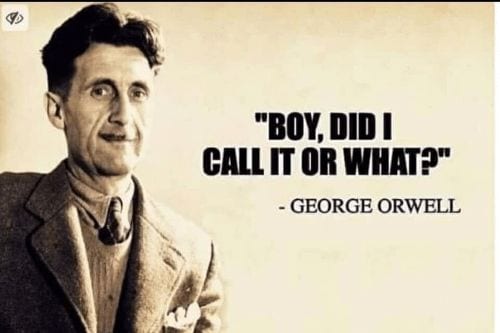QUOTE OF THE DAY AT SAMIZDATA*: People who clutch at Mr Putin are like a drowning man – clutching at a poisonous snake.
Orwell Was Right (excerpt) Matt Taibbi, TK News
The ideal citizen of Orwell’s Oceania bubbled with rage a mile wide and a millimeter deep and could forget in an instant passions that may have consumed him or her for years. We just did this, with a pandemic that had the country steaming with indignation until it was quietly declared overthe moment Putin rolled over Ukraine’s borders. We switched from “the pandemic of the unvaccinated” to “Putin’s price hikes” in a snap. National outrage moved a few lobes over with zero fuss, and now we hate new people; instead of “anti-vax Barbie,” we’re barring Russian and Belarussian kids from the Paralympics.
Not sure who the “we” is here, however.
THE LESS YOU KNOW, THE BETTER YOU SLEEP:
In its September 2009 GQ carried an interesting article by Scott Anderson on the September 1999 apartment bombings in Russia that left hundreds dead and led to Vladimir Putin’s rise to power. The piece profiled former Russian FSB officer Mikhail Trepashkin and collected evidence suggesting that the bombings were perpetrated by the FSB rather than by Chechen terrorists.
It was the kind of intriguing investigative piece that most publications would have featured prominently, but GQ buried it. Purchasing a copy of the magazine, I first spent several minutes trying to find the issue’s table of contents (I gave up), and then the article itself, afraid I’d blown $4.50 on the wrong issue of the magazine. I found the article at page 246 of the September issue. NPR explained the mysterybehind GQ’s treatment of the story.
* * * * * * * *
Satter’s National Review article “The unsolved mystery behind the act of terror that brought Vladimir Putin to power” provides a good summary. David Pryce-Jones reviewed the book for National Review in “Russia moves toward a reckoning.”
“I’m not saying we won’t get our hair mussed“
LOST DECADE: Taking back the ‘90s.
The ‘90s don’t get a lot of love. The last decade of the 20th century is often seen as a kind of pregnant pause – a political and social interregnum between an event that put an (apparently) full stop on the conflict that had shaped much of the previous century (the Cold War) and one that shifted our gears into a new reality for which we weren’t prepared (the World Trade Center attacks). It was the decade that began with talk about a “peace dividend” and “the End of History,” and ended just as the internet was about to transform the way we read, learned and communicated.
There’s an argument that dividing history up into decades, or even centuries, is an arbitrary activity, shoehorning events and retroactively making judgments about what was important based on hindsight. Writing about “decade-ism” in the Journal of Social History in 1998, Jason Scott Smith said that “the concept of the decade represents thinking about time in a punctuated, discontinuous manner. Discontinuous time encourages viewing history not as a seamless web of events, but as discrete, temporally fragmented snapshots.”
We know now that the Cold War didn’t really go away as much as transform into something baroque, with Russia and China and the West assuming the stance of wary sides in a fight, eyes darting from one opponent to another like the gunfighters at the end of The Good, the Bad and the Ugly. (Your politics will help you decide who is which; you might even argue that Europe and America are no longer one, homogenous West, and that the end of the bilateral world is turning the gunfight into a melee.) We also know that terrorism against the West has long roots and precedents, and that 9/11 was mostly an institutional failure of imagination, policy and vigilance. Seen in that light, the ‘90s don’t seem like an interregnum as much as an anxious lull between eruptions.
Related: The Media May Hate Brutal Putin Now, But Gushed Over ‘Mighty’ Soviet Union Then.

